NYFA
This is a grant proposal I wrote for New York Foundation for the Arts. I spent about 8 hours in editing and preparing this document. This grant is for $7000 for New York State artists. I am sharing this document because I think it’s a shame that artists spend so much time and energy into proposals, and 99% of the time it’s only viewed by handful of people. I encourage my colleagues to share their thoughts with other artists and the community. Some text of this proposal is recycled from older writings. This document is almost identical to what I submitted to NYFA except few extra images at the bottom.
Work statement
200 words statement that directly relates to and explains the work sample submitted. Work Statements will be available for panelists to read as they view your work sample.
I make devices that are opposite to common ‘Black Box’ products in the market. Instead, they are tools to imagine other ways of computating; primairly for communicating and remembering. I have been making series of conceptual designs and working prototypes to examine possibilities of modular, open source computer that operate on affective signals beyond binary logic. Once the proof of concept is realized, I find situations where they can activate human relations with nature, urban space and memories of past and future. What excites me most about building physical interfaces is that they can stimulate potentialities hidden in everyday objects. Some projects were used during real life situations of protest and political gatherings as well as staged performances. While the projects only engage with the space and people through ephemeral contact, they continue to generate conversations in art spaces and online/ offline publication.
My projects reside on the borderline of function and fiction, mixing melancholoy and humor, providing critical reflection on our relationship with technology. While my artistic process involve technical research and development, the end goal is social and aesthetic exploration of our relationship with technology. The attached worksample presents an overview of my working process and direction.
Work sample
65 words description with image. Title, Material, Dimension, Date, File
1. Schematic for NAND CAT
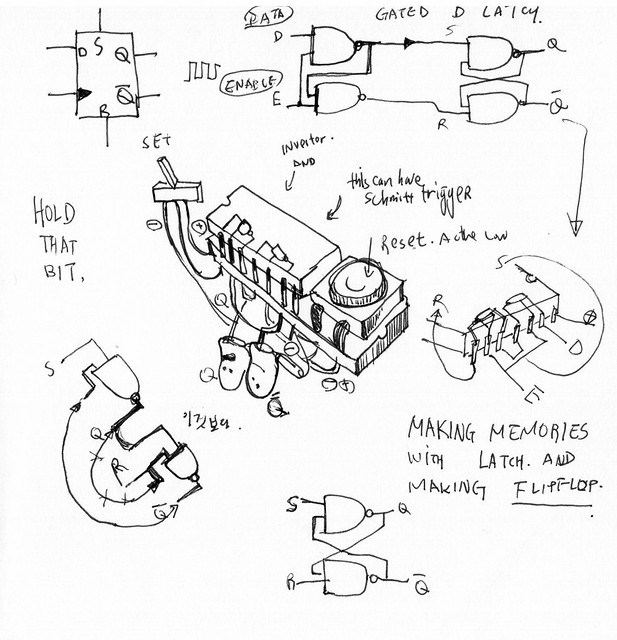
- Material: pen drawing on paper
- Dimension: 8 * 8 inches
- Date: 2013
- Description: This is a design to use Schmitt Trigger NAND (Not-AND Logic gate) as a modular computational building block. I often draw schematics for circuit and comics for software.
2. School for poetic computation kit

- Material: Discrete electronic components and containers
- Dimension: 5 * 6 inches
- Date: 2013
- Description: I find appropriate material from electronics, paper and other found material necessary to realize the project. I see these kits as something in between Fluxus boxes and instructional art. Teaching is an important part of my practice. This kit was used during SFPC as well as Making Lab at Anyang Public Art Projects, an institution that commissioned kit production.
3. Bit shifter
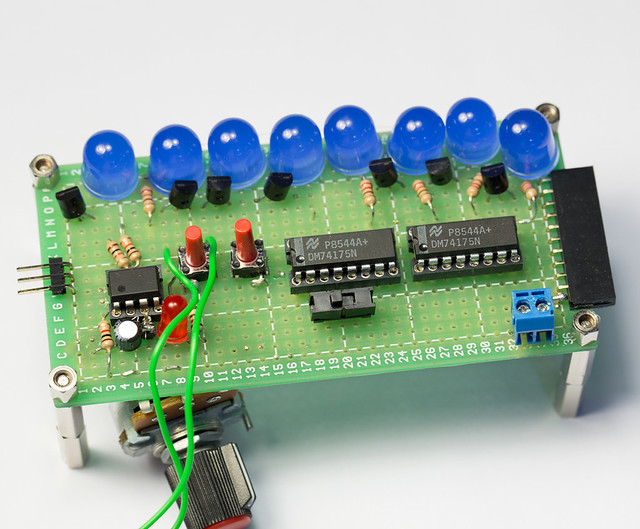
- Material: Integrated circuits (D-type flip-flops), Perforated board, wire wrapping material
- Dimension: 6 * 7 * 4 inches
- Date: 2013
- Description: After repeated process of breadboarding and designing, I create a final circuit as proof of concept. The production process always involves learning, and I try to share my discoveries with others. I co-founded School for poetic computation to dedicate in sharing knowledge and build community.
4. Input = Output
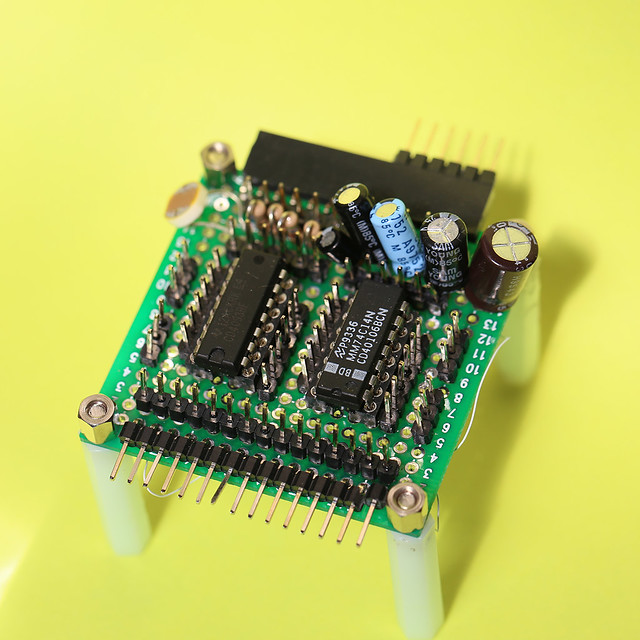
- Material: Integrated circuits (NAND * Inverters), Perforated board, wire wrapping material
- Dimension: 4 * 4 * 3 inches
- Date: 2013
- Description: This module is a self-contained building block to generate signal and also it can be configured to create all kinds of binary logic within the system. Sometimes, the prototype becomes a platform for collaboration. This module ‘Input=Output’ is born out of conversation with another artist, Kyle McDonal, who built a software with a related concept.
- Video
5. Bird Call
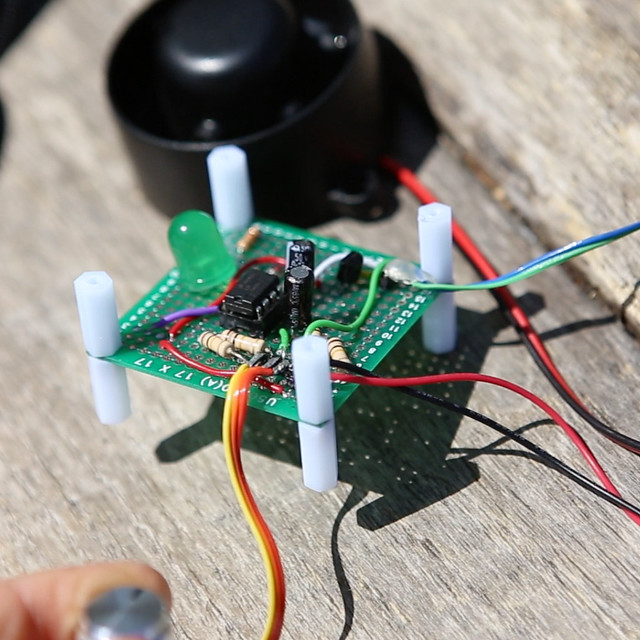
- Material: Op amp, analog circuit, speakers
- Dimension: 3 * 3 * 3 inches
- Date: 2013
- Description: It is most exciting to bring the interfaces out in the nature and use it to communicate with nature. This time, I was trying to communicate with the birds by producing high frequency sound with an operational amplifier.
- video
6. Pixel pusher
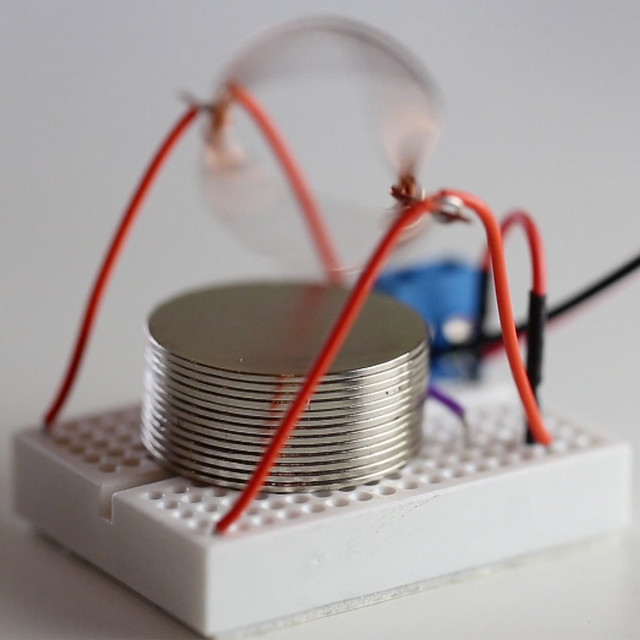
- Material: Magnet, copper wire and electricity
- Dimension: 2 * 2 * 1 inches
- Date: 2012
- Explanation: This module is from a series of attempts to actuate physical output from electric signal. Hand coiled copper wire reacts to magnetic field generated around the magnet and battery.
- video
7. Occu-bot
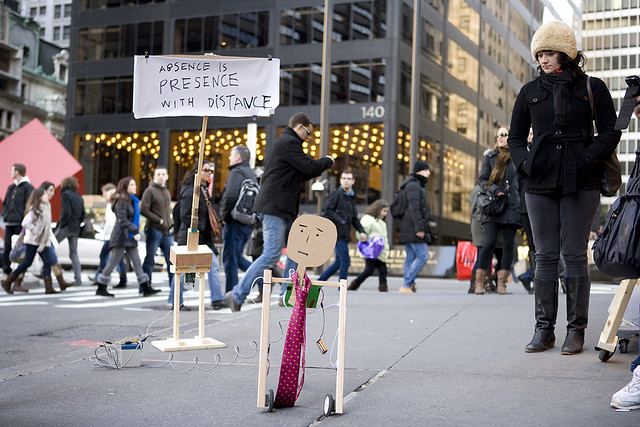
- Material: Found material, custom robots, batteries, microcontroller
- Dimension: variable
- Date: 2010~1
- Explanation: Occu-bot is a robotic protester that can fill in for human civil disobedience. Can an automatic mechanism support for a social change? The robots were deployed in Zuccotti Park after eviction of Occupy Wall Street. This project became part of a larger installation ‘Speakers corners’ at Eyebeam Art and Technology Lab
- video
8. Ghost box

- Material: USB Thumb drive, Linux OS, Data and software
- Dimension: 2 * 3 * 1 inches
- Date 2013:
- Explanation: While my work is primairly opensource and public access, I am increasingly fascinated by the beauty of privacy. This is a tiny Linux computer that runs on a thumb drive with custom software and documents about my secrets. The drive was sent to a stranger who promised to run the software and pass on to another stranger. I am excited about the point where mail art meets operating systems.
Additional Statement (Required):
Applicants must provide a 400 word statement describing the relationship between the support materials and the work (i.e. is it the work itself or a documentation of the work?), the role of the computer in the work’s genesis, and the circumstances in which the viewer/audience experiences the work.
The supporting materials attached in this proposal are mostly from my interdiscplinary research and development. I create work through process-based explorations on a theme or technique that I’m fascinated by. It is an artistic Research & Development without a single end goal other than sincere provocations for more conversation. Some of my interest are broader than technology and computation. I am invested in learning about the ecology of urban and natural habitat. Traditional print publication has been most effective so far in documenting research based projects as such. Video documentation of performance and work in progress are records of attempts in hacking the aesthetic and social systems.
I prefer interventions(customer-complaint) as opposed to making inventions(products). It’s related to my desire for anti-spectacle in art. My aversion to art as commodified experience comes from brief experience of working for design agencies. Technical R&D and media production share the unrealistic idealism of continual progress and development. I feel uneasy when art tries to mimic celebration of perpetual creativity like Culture Industry. Instead, I’m fascinated by art as philosophical journey.
There is poetics in the moment when boolean logic meets electricity (hardware) and when language meets mathematics (software). How much of our experience is scripted and our interaction is designed around electronic products? How do they simulate presence over distance and time? and how are we alienated in presence of others? My projects are inspired by socially constructed imaginary needs and new necessities for digital habitat. They will reveal our life will not be complete by products as such, and human relationships can not be replaced by technology. While electric signal and code command machines, affect and access bring presence into human.
my work is best experienced in an exhibition with performance. The performance may be activated by myself or other performers. The best example of my projects in display is ‘Speakers Corners’, an exhibition at Eyebeam Art and Technology Center, where I occupied the exhibition space to build installation and also host conferences for activists and technologists. The overall process of artistic exploration as well as social engagement made sense together as an immersive experience.
Cultural Statement (Optional):
A 400 word statement to be used if your work is rooted in a specific technique and/or cultural tradition and requires additional explanation. Statements will be available for panelists as they view your work sample. If you are not submitting a cultural statment, enter “n/a” in the field below.

In the summer of 2011, I received curious emails about planning a rally near Financial District in New York City. I’ve made friends with local activists and community organizers by collaborating in public events and classes such as ‘Civil Disobedience in 21st Century’ (July 2011, Eyebeam): a class about applying game design strategies for social movement. Sharing excitement of Arab Spring and student protest in Europe, New York activists prepared for a right chance. By September, Occupy Wall Street movement was just beginning and to everyone’s surprise, it grew to be something larger than anyone anticipated. I learned a great deal about potential of restructuring the way we approach global problems through open process and community building.
A park that was non-space for tourists became a commons. It was a rare chance that people from different neighborhood came to discuss their issues through cheerful argument and sometimes in confrontation. The only shared consensus was that there is something wrong with global financial system and it is affecting everyone.
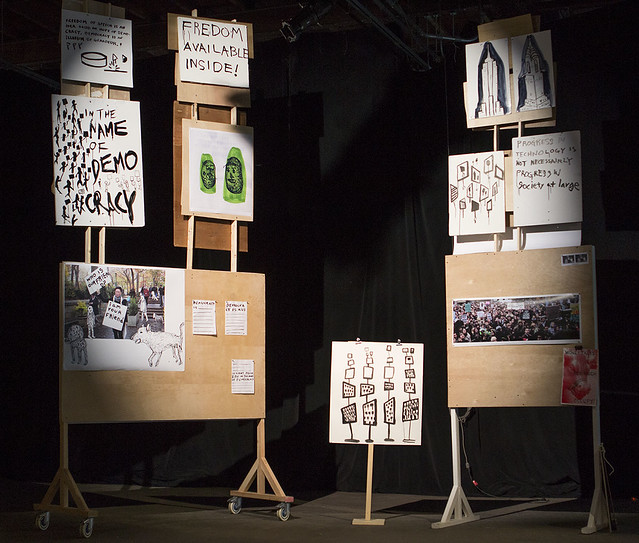
Installation shot from Speakers corners at Eyebeam
I did not sleep in the park but I organized about several classes and performance directly related to OWS. The events range from open class on ‘Learning from OWS’, ‘Performance Art’, ‘Freedom of Speech’. Many of these classes were made in collaboration with The Public School New York, a collective project that organizes free classes which I served as one of the organizer. It was my intention to have a class for people who are not familiar with OWS can come and ask questions to the occupiers, clear out misunderstanding and most importantly, to use the horizontality as a learning method. After the occupation was evicted, I continue to support activists, artists and engineers to by organizing ‘Activist Technology Demo Day’(Feb 2012) and ‘On The May Day General Strike’ (April 2012) in hope of the positive learning and good spirit to continue.
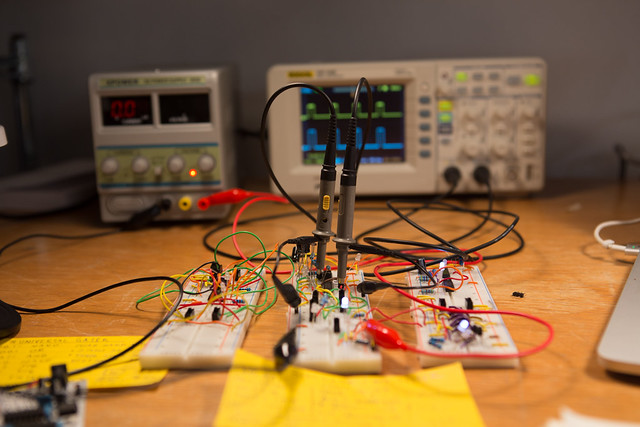
Preparing for a lesson
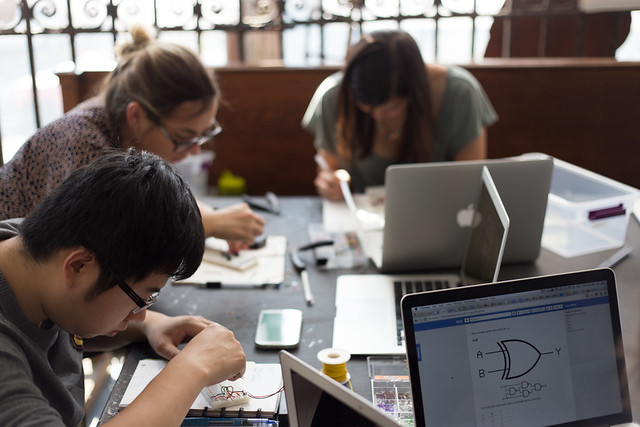
Circuits class at School for poetic computation. For more pictures check this stream.
I still keep some of the experience in the fall of 2011 in my heart. The greatest learning was about having empathy toward strangers and also joy of sharing. I am investing my energy in more sustainable modes of creative community, by co-founding School for poetic computation. It is an artist-run school that teach technologists and designers a poetic ways of programming and hacking. The School is practicing functional horizontality and radical transparency in art and technology education.